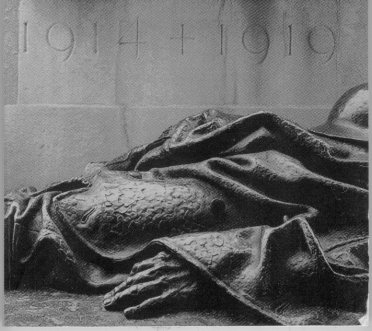 Charles Sargeant Jagger's Royal Artillery Monument at Hyde Park Corner, London
Charles Sargeant Jagger's Royal Artillery Monument at Hyde Park Corner, London WAR IS BRUTAL, DESTRUCTIVE, and unutterably horrific. War is heart-breakingly tragic. War is hell. War very rarely has winners, only those who have lost the least. War, as The Age once said, "is a dangerous and terrible thing, which should only ever be seen as a last resort." In short, war is the second-worst thing on earth.
Wars are not natural events or accidents, like earthquakes, landslides or hurricanes. No, like economic depressions, totalitarian dictatorships and murder by concentration camp, wars are neither acts of nature nor 'Acts of God': Wars are acts of man -- of men who seek to achieve their values by violence, resisted by those who rise to defend their own lives, their values, and their sacred honour.
Wars are the result of aggression by those who see value only in force, and who see other human beings as chattel.
They are the second-worst thing on earth only because the very worst is tyranny: an act of war by governments against those they are supposed to protect. It is with the existence of tyrannical governments that wars of conquest and campaigns of terror begin—indeed, throughout history, it is tyrannies and slave states which have always begat wars.
It is those who seek their values through violence that make war possible; it is the existence of such entities that make wars of self-defence and liberation necessary.
IT IS NOT ENOUGH simply to declare oneself against war and wish war's destruction would go away. Pacifism itself only rewards aggression. Pacifism kills. It is necessary to oppose aggression and to resist tyranny.
When aggressors seek Lebensraum, then appeasement only rewards the aggression –- and only fuels further aggression. Peace with tyrants is never genuine peace, since tyranny itself respects no borders. When slave pens are allowed to flourish, then peace means peace without safety—and peace without justice.
Peace without justice rewards the tyrannical, rearms the aggressor, and is an injustice to those whom the tyrants enslave and kill. Every semi-free country has the right to defend itself against aggressors; every semi-free country has the right (but not the duty) to liberate the slave pen. As long as some human beings choose to deal with other human beings with the whip, the chain and the gun -- with stonings, fatwahs and holocausts -- with the torture chamber, the dungeon and the gulag -- as long as some men continue to enslave and attempt to enslave others, then wars will continue to happen, we will continue to need to be ready to defend ourselves, and we should all remember to thank and respect those who take on that job.
As George Orwell is supposed to have said,
He speaks, of course, of “rough men” acting in your defence against those aggressors who would do you violence. As David Kopel concludes, speaking in this context, if you want to give thanks for peace then thank a soldier.People sleep peaceably in their beds at night only because rough men stand ready to do violence on their behalf."
IF WE HAVE THINGS WORTH living for -- and we do -- then for that much at least we all have things worth defending. As Thomas Jefferson observed over two-hundred years ago, the price of our liberty is eternal vigilance. Two-hundred years later, nothing has changed. If war is horrific, then tyranny is worse.
In the name of liberty, then let us resolve to remember—and oppose—the roots of all wars. In Ayn Rand’s words:
Lest we forget. Take time today to remember those who lost it all for your freedom. They did more for peace than anyone who protests for it ever has.If men want to oppose war, it is statism that they must oppose. So long as they hold the tribal notion that the individual is sacrificial fodder for the collective, that some men have the right to rule others by force, and that some (any) alleged ‘good’ can justify it—there can be no peace within a nation and no peace among nations.”
4 comments:
Very poignant.
Nicely constructed.
Well done.
Kudos.
Quote from an Australian theologian:
Sydney's Anzac War Memorial is designed like an ancient Greek temple. Inside it features Rayner Hoff's stunning 1934 bronze sculpture, Sacrifice, which depicts the body of a soldier held aloft on the altar of his shield, his arms draped across a sword in a posture of crucifixion, while the whole form rises like a phoenix from the flames below. It is a majestic image, a portrayal of worship, devotion and sacrifice. It's hard to imagine a more vivid representation of the cult of war that lies at the heart of the modern nation-state.
Go check the photos. An amazing and disturbing structure.
Ropata
Yes, it is a disturbing structure. So is the War Memorial in Canberra.
--
War, what is it good for?
War is the health of the state.
LGM
Indeed. Excellent.
Post a Comment